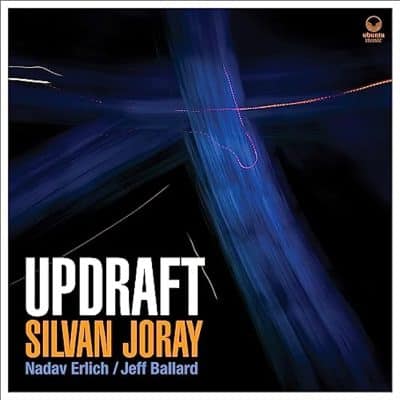Silvan Joray UPDRAFT
 Silvan Joray
Silvan Joray
UPDRAFT
Ubuntu Music
The Swiss-born, NYC-based guitarist Silvan Joray is releasing UPDRAFT, his second album as leader. Having established considerable acclaim in Europe, Joray is poised to expand his footprint in the U.S. and globally. Beginning as many Europeans do, he studied classical guitar but when hearing jazz, he switched to electric guitar, captivated by the sound of Wes Montgomery who he cites as an early influence. He began to shape his own sound and compositions while studying at Jazzcampus in Basel under the tutelage of Austrian guitarist Wolfgang Muthspeil. Yet, while the two guitarists share the attributes of crystalline tone and sharp articulation, Joray is a much different player stylistically than Muthspiel, the latter often focused on single notes and a minimalist approach while Joray often plays rapid, machine gun flurries of notes as he uses quarter tones (intervals that fall between the 12-tone octave) and tapping (Usually employed by rock guitarists, it’s a string being fretted and set into vibration as part of a single motion), neither typically associated with jazz guitar playing. His trio for this outing is quite formidable with Israeli double bassist Nadav Erlich and drummer Jeff Ballard, a core member of Brad Mehldau’s longstanding trio and a resume that includes Chick Corea, Pat Metheny, and Joshua Redman as well. The salient aspects of this recording are both Joray’s inventive techniques and his sterling interplay with Ballard.
Joray composed nine pieces and interprets two others, combined for a total of 55 minutes. The bassist delivers a robust intro to the opening “Kokodrillo” where Joray soon engages in the first of many convivial dialogues with Ballard, issuing some straight-eighth grooves as Ballard keeps a steady, dominant pulse in this, the lengthiest track at seven minutes. “Kaeppelview” plays similarly, with Joray up and down the scales with cascading notes, almost as if in conversation with himself while the bassist and drummer are in their own realms. The title track continues in this vein with a bit more energy as Joray fires off his quarter tones and we hear the tapping technique distinctly for the first time. Erlich is a fierce bassist in his pizzicato solo while Ballard trades eights with the guitarist accenting his snare rolls with cymbal flourishes.
We hear a more relaxed, gentle side of Joray on the brief “Morning Breeze” which seamlessly segues into “Very Sweet Stuff, But Nice,” also played more delicately as Ballard moves to brushes (and maybe even just his hands as this writer has seen him do in live performance.) The answer to “Morning Breeze” comes later in the form of “Evening Breeze,” which differs just slightly as all are awake as reflected in slightly more animated tones.
Andrew Hill’s ‘Subterfuge ’from 1964 is the first cover. Hill, was of course, from the Monk school – jagged and angular, the runs here emulated in great form by the guitarist while Ballard sends up a maelstrom on the kit and Erlich seems to drive most of the chordal jumps present in the original and launches a most animated solo as well. It’s the only true standard here and the second cover is Cole Porter’s “At Long Last Love,” with Ballard and Erlich setting an engaging rhythm pattern over which Joray glides fluidly, the solo differentiated from the head by just a few more notes (here are those quarter tones again) but as lovely as the piece is, they’ve basically deconstructed it and built it back. Both the Wes Mongomery influences and Joray tapping tendencies show through prominently.
There are three other Joray originals – the lightning runs and masterful interplay between Joray and Ballard in “The Liar” with more trading on the eights, “Kurtish,” with its playful mid-tempo pattern and riff that proves a declarative feature for the bassist and reveals the most engaging bass-drum conversation on the disc; and “Something Ahead,” with its foreboding, march-like tempo has Joray finally relying less on speed, often alternating his rapid-fire cascading runs with judicious notes and chords. But wait! As the piece evolves Joray reverts to his blazing note scattering and colorful clusters.
In the end, as impressive as Joray is, this writer is seeking more of a balance such as the melodic sense displayed in the Porter tune or the relaxed nature of the two “Breeze” songs. In other words, Joray would be better served with “less is more” than “more, more, and then more.” Regardless, the album is worthy as his techniques are impressive and his trio mates shine brightly too.
- Jim Hynes
Buy Us a Cup of Coffee!
Join the movement in supporting Making a Scene, the premier independent resource for both emerging musicians and the dedicated fans who champion them.
We showcase this vibrant community that celebrates the raw talent and creative spirit driving the music industry forward. From insightful articles and in-depth interviews to exclusive content and insider tips, Making a Scene empowers artists to thrive and fans to discover their next favorite sound.
Together, let’s amplify the voices of independent musicians and forge unforgettable connections through the power of music
Make a one-time donation
Make a monthly donation
Make a yearly donation
Buy us a cup of Coffee!
Or enter a custom amount
Your contribution is appreciated.
Your contribution is appreciated.
Your contribution is appreciated.
DonateDonate monthlyDonate yearlyYou can donate directly through Paypal!
Subscribe to Our Newsletter
Discover more from Making A Scene!
Subscribe to get the latest posts sent to your email.














































